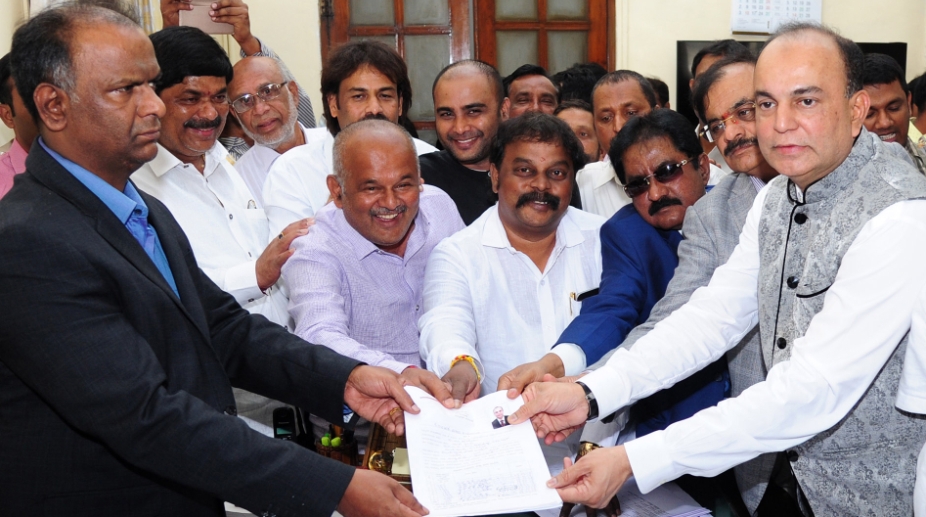Congress announces candidates for by-polls in Himachal Pradesh
The party is yet to declare the candidate for the third Assembly constituency Dehra.

JD(S) candidate for Rajya Sabha polls BM Farooq files his nomination papers at Vidhan Soudha in Bengaluru on 9 March 2018. (Photo: IANS)
The elections to the 58 Rajya Sabha seats from 16 states will be conducted on 23 March. A total of 64 candidates are in the fray. But 33 candidates from 10 states were elected unopposed on 15 March, bringing the battle down to just six states and 25 seats with six people certain to lose the elections.
Let us have a look at the complete list of those who have been elected unopposed:
Advertisement
Andhra Pradesh
Advertisement
1. CM Ramesh – Telugu Desam Party
2. KR Kumar – Telugu Desam Party
3. VP Reddy – YSR Congress Party
Bihar
1. Ravi Shankar Prasad – BJP
2. Akhilesh Prasad Singh – Congress
3. Mahendra Prasad – Janata Dal (United)
4. BN Singh – Janata Dal (United)
5. Manoj Jha – RJD
6. Ashfaque karim – RJD
Gujarat
1. Parshottam Rupala – BJP
2. ML Mandaviya – BJP
3. Naranbhai Rathwa – Congress
4. Amee Yajnik – Congress
Haryana
1. Lt Gen DP vats – BJP
Himachal Pradesh
1. JP Nadda – BJP
Madhya Pradesh
1. Rajmani Patel – Congress
2. Dharmendra Pradhan – BJP
3. Kailash Soni – BJP
4. AP Singh – BJP
5. TC Gehlot – BJP
Maharashtra
1. Prakash Javadekar – BJP
2. Narayan Rane – BJP
3. V Muraleedharan – BJP
4. Anil Desai – Shiv Sena
5. Kumar Ketkar – Congress
6. Vandana Chavan – Nationalist Congress Party
Odisha
1. Prashanta Nanda – Biju Janata Dal
2. Achyuta Samanta – Biju Janata Dal
3. SR Patnaik – Biju Janata Dal
Rajasthan
1. Kirodi lal Meena – BJP
2. Madan Lal Saini – BJP
3. Bhupender Yadav – BJP
Uttarakhand
1. Anil Baluni – BJP
On 23 March, the elections will be held for the remaining 25 seats in the six states. There are a total of 31 candidates in the fray.
Uttar Pradesh – 10 seats, 11 contenders
1. Arun Jaitley – BJP
2. Ashok Bajpai – BJP
3. Vijay Pal Singh Tomar – BJP
4. Sakal Deep Rajbhar – BJP
5. Kanta Kardam – BJP
6. Anil Jain – BJP
7. GVL Narsimha Rao – BJP
8. Harnath Singh Yadav – BJP
9. Anil Agarwal – BJP
10. Jaya Bachchan – Samajwadi Party
11. Bhim Rao Ambedkar – BSP
West Bengal – 5 seats, 6 contenders
1. Nadimul Haque – TMC
2. Subhasish Chakraborty – TMC
3. Abir Biswas – TMC
4. Santunu Sen – TMC
5. Abhishek Manu Singhvi – Congress
6. Rabin Deb – Left Front
Karnataka – 4 seats, 5 contenders
1. Rajiv Chandrasekhar – BJP
2. Dr L Hanumanthaiah – Congress
3. Dr Syed Naseer Hussain – Congress
4. GC Chandrasekhar – Congress
5. BM Farooq – Janata Dal (Secular)
Telangana – 3 seats, 4 contenders
1. Joginapalli Santosh Kumar – Telangana Rashtra Samiti
2. Banda Prakash Mudiraj – Telangana Rashtra Samiti
3. Badugula Lingaiah Yadav – Telangana Rashtra Samiti
4. Porika Balram Naik – Congress
Jharkhand – 2 seats, 3 contenders
1. Samir Oraon – BJP
2. Pradeep Senthalia – BJP
3. Dhiraj Prasad Sahu – Congress
Chhattisgarh – 1 seat, 2 contenders
1. Saroj Pandey – BJP
2. Lekhram Sahu – Congress
***
Of the 245 Rajya Sabha members, 233 are representatives of the states and union territories of Delhi and Puducherry, while 12 have been nominated by the President. The nominated members are persons having special knowledge or practical experience in respect of matters such as literature, science, art and social service.
Read More: Rajya Sabha Elections 2018 on March 23: All you need to know
A party needs 126 seats to get a majority. The ruling BJP currently has 58 seats, followed by the Congress that has 54. On the 16 states set to get new representatives, 11 have a BJP government, which gives the party a chance to improve its tally.
The results will be declared on March 23 evening. Counting of votes will begin from 5 pm.
A Rajya Sabha member is elected for a full term of six years. A byelection is held if a vacancy arises for reasons other than retirement of a member on the expiry of his or her term. A member elected in a bypoll remains member for the remainder of the term of the member who had resigned or died or has been disqualified.
Advertisement
The party is yet to declare the candidate for the third Assembly constituency Dehra.
As many as 54% of BJP candidates in the fray for the Odisha Assembly polls in the first phase on May 13 are facing trial in serious criminal cases, according to poll rights body Association for Democratic Reforms (ADR).
Vadra also claimed that he has been approached by different parties to come along.
Advertisement
